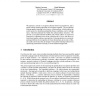499 search results - page 20 / 100 » Search Engines that Learn from Implicit Feedback |
93
Voted
WWW
2010
ACM
15 years 6 months ago
2010
ACM
In this paper, we propose a semi-supervised learning approach for classifying program (bot) generated web search traffic from that of genuine human users. The work is motivated by...
105
Voted
NIPS
2003
15 years 14 days ago
2003
We present a system to recognize phrases based on perceptrons, and a global online learning algorithm to train them together. The recognition strategy applies learning in two laye...
107
click to vote
BNCOD
2007
15 years 17 days ago
2007
This paper presents WordRank, a new page ranking system, which exploits similarity between interconnected pages. WordRank introduces the model of the ‘biased surfer’ which is ...
89
Voted
CIKM
2009
Springer
15 years 5 months ago
2009
Springer
No search engine is perfect. A typical type of imperfection is the preference misalignment between search engines and end users, e.g., from time to time, web users skip higherrank...
CIKM
2010
Springer
14 years 9 months ago
2010
Springer
The power of search is with no doubt one of the main aspects for the success of the Web. Currently available search engines on the Web allow to return results with a high precisio...

